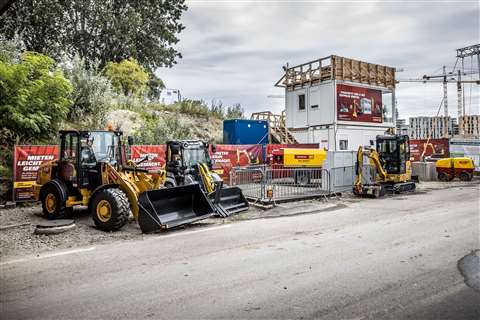How Zeppelin Rental is adapting to the platform economy
24 April 2023
Parked outside the construction works at Vienna’s North Station in Austria stand a collection of two wheel loaders, metal fences, site huts, a mini excavator, an air compressor and compactor next to a huge banner proclaiming ‘Mieten leicht gemacht’ (Renting made easy).
German rental company Zeppelin Rental is hoping that these pieces of equipment, seemingly-abandoned next to a major construction site in Vienna’s Second District, could provide the equipment rental industry’s answer to a platform economy model for its customers.
Multibillion-dollar online platforms such as Uber, Lyft and Airbnb have already been a disruptive force in many industries. They tend to use a business model where, rather than providing a direct service to customers, businesses create an online meeting place where customers can then rent or borrow goods from each other.
 Zeppelin Rental’s Rental+ assets are stored on or close to a worksite and accessed digitally. (Photo: Zeppelin Rental)
Zeppelin Rental’s Rental+ assets are stored on or close to a worksite and accessed digitally. (Photo: Zeppelin Rental)
In June 2022, the company announced that it was launching its “Rental+” app. Zeppelin’s strategy is to liaise with its customers working on major construction projects to decide what equipment they are likely to need to hire.
Zeppelin Rental then stations a small fleet of these machines either directly on the construction site or on a defined area close by. Customers can search for available machines on their smartphones and book them online.
Once a machine has been rented, the customer can then unlock it using a smartphone. The physical key is located in a key safe in the machine and the code is provided in the app.
The scheme borrows ideas from increasingly popular car-sharing platforms. These portals, which include the likes of Share-now, Evo, Zipcar, Gig, Turo, Modo and Hiyacar, enable registered customers to find out via an app where the nearest available car is currently located and then unlock it using their smartphones.
Payment is completed online, and the car is photographed before and after the share takes place, so any damage is noted.
Benjamin Höck, head of division, digital business and partnering at Zeppelin Rental is the man charged with finding a way for Zeppelin Rental to adapt its business model to encompass the rise of the platform economy – a challenge he says which is trickier than most customers first imagine.
“Everyone knows from the automotive industry or from other consumer platforms how this model works,” he says. “But when it comes to implementation this is a very different service-oriented industry, one hardly cannot copy paste digital solutions from one to another industry.”
For Höck though, the tricky but is not adapting the technology to suit the model but rather setting up the offline rules and standards necessary to make the model work.
Digitalisation of construction
“If you rent a car at Sixt or Hertz for two days and you decide to extend it to five days, depending on the contract, you would probably have to pay a penalty. They might even charge you double. In the construction sector we do not have those standards at the moment. Perhaps we should try to follow them, but I think this should be a common approach from all the rental companies.”
Moreover, for Zeppelin Rental, like many other rental companies, the transition to digital is a slow process in an industry where many companies still rely on phone calls to do business. Höck says that although Zeppelin Rental’s online business is increasing rapidly, it currently only accounts for a small amount of overall company revenue – and the majority of that business comes from the company’s own website rather than any external source.
The company set up Klickrent nearly a decade ago to compete with a growing number of equipment rental aggregators such as Klarx which were popping up to serve the sector, and it is closely monitoring the quickly evolving online marketplaces such as Felux and Sequello where customers can order construction materials.
“There are new platforms setting up all the time but also disappearing too,” he says. “When we look at them, none of them is outperforming the market like booking.com did in the hotel industry ten or 15 years ago. Even when you look to other industries these days, companies are pursuing a strategy of putting their own website first. For example, Lufthansa has changed its strategy and now says that it will always ensure that its flights are cheaper on Lufthansa.com than you can find on an aggregator.”
 Benjamin Höck, head of division, digital business and partnering at Zeppelin Rental. Photo: Zeppelin Rental
Benjamin Höck, head of division, digital business and partnering at Zeppelin Rental. Photo: Zeppelin Rental
“You can only compare the comparable. It is really a 4-tonne excavator or is it a 4.5-tonne excavator? What about the engine? What about the amount of emissions it produces?” he adds.
The challenges of moving from traditional rentals to digital platforms
Taking this idea further, Zeppelin Rental has been working with some of its key account holders since 2021 to integrate its services into their in house e-procurement systems such as SAP Ariba and Onventis which are increasingly relied on by big firms to manage all of their enterprise resource planning (ERP) including e-procurement, accounting, and invoicing.
Currently SAP Ariba alone boasts that more than 5.3 million companies use the Ariba network to transact US$3.75 trillion worth of transactions each year – more than Amazon, Alibaba and eBay combined.
However, despite some success, Höck says that for the rental industry, the standards around the technology have not yet evolved sufficiently for this to become seamless.
The software have not been designed with equipment rental in mind, making it harder to get the vendor’s apps to talk to the software because the rules governing how they interact or APIs (application programming interfaces) have not been fully worked out.
“This is where the construction industry is realising it’s not e-procurement like buying products from Amazon and other portals where you have standard APIs on both sides from the seller and the buyer,” he says.
“Our experience and that of our key accounts, is that for rental, things like interfaces are not as well defined yet as they are used to from portals where they buy products like construction materials.
“Usually, this is a quite standardised process so when they buy insulation for example, they just order it through the portal of a company that specialises in building insulation. But it’s not the standard they can follow on to make a reservation or to order an excavator to rent.
“So, whenever we have the API integration or the API is set, our customers are realising that they need to have a customised process concerning the rental order. “
Nonetheless, Höck says that by creating more digital channels, Zeppelin is simply creating more choice for its customers.
“No matter which channel the customer follows – in the end he will always be serviced by Zeppelin Rental,” he says. “Thus, we follow customer needs and try to optimize all our channels constantly. Over time you will get even more ways to get into contact with us – some of them are owned by the rental company itself, some are owned by maybe a consortium of rental companies or a platform which is maybe moving from one industry to another. I think the portfolio will just increase. In the end the customer will decide on where the volume goes.”
STAY CONNECTED



Receive the information you need when you need it through our world-leading magazines, newsletters and daily briefings.
CONNECT WITH THE TEAM








